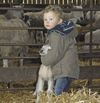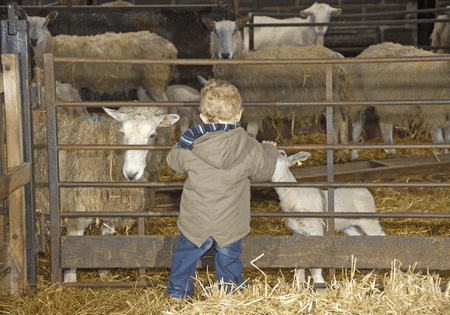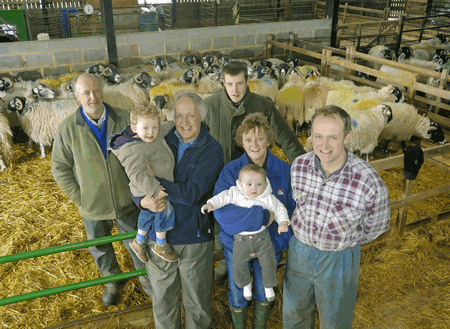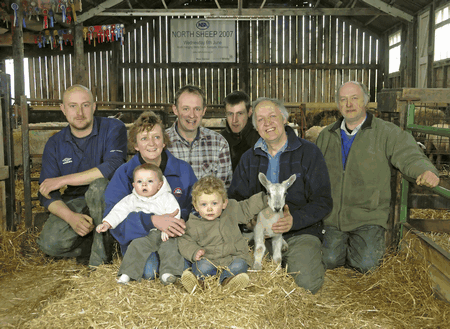Working hard and moving forward

There isn’t a family motto above the front door of the farmhouse at North Hanging Wells, but if there was it would probably say: “Never let the grass grow under your feet.”
It’s a motto that would certainly sum up the Skidmore family’s approach to life. It would be apt, even if taken literally, because they would probably reckon any grass that did grow could be put to far better use by being grazed.
And no one knows that more than brothers John and Maurice Skidmore. Their father Bill’s opportunistic approach to life has been at the heart of this family’s success. It’s an ethos which his children were brought up – and thrived – on and has remained at the core of their own determination to develop the successful farming business their parents started.
“When we went out for a drive on a Sunday afternoon our dad would keep an eye open for any fields that weren’t being grazed,” says John. “If he spotted one he’d soon have the field rented and some stock grazing it.
“He always had a cow ready to graze a spare acre and if he’d got too much hay in the barn he’d have gone out and bought an extra cow to eat it,” recalls John with a wry smile.

The Skidmore family’s farming business has come a long way since the post-war days when Bill – a first-generation farmer – and his wife Vera struggled to get a start as tenants. But even though the Skidmores now farm almost 6000 acres and run about 4500 Swaledale ewes, this is a business that faces its daunting daily workload with determination as well as good humour, and a total commitment from all the family.
“I can honestly say it’s a poor day when we don’t have a good laugh about something, and that’s very important,” says John, who admits that the nearest the family comes to a board meeting is when he is with his brother driving the cattle wagon.
Snaking along the road that takes you across the vast moorland expanse of Weardale in Co Durham puts this area’s farming into perspective. This is a landscape that takes no prisoners. It yields little and only then to those who never shirk hard graft or question the point of it all.
Bill and Vera Skidmore, now in their late seventies, took their first farm tenancy at East Biggens Farm, Frosterley in Lower Weardale, in the early 1950s.
Their children – John, Maurice, Jean and Dennis – were all born at Frosterley, but in 1963 moved to the 500-acre College Farm near Haltwhistle on the Cumbria-Northumberland border.
Five years later the family made their most significant investment. They bought North Hanging Wells – a hard hill farm at Eastgate near Stanhope – and that was the turning point.

North Hanging Wells is a name that has become synonymous over the years with livestock production from hill land. At 1500ft in the Rookhope Valley, it has proved an invaluable learning ground for John (55) and his wife Brenda, Maurice (53) and his wife Carol, and latterly John’s son Ian (35), who is married to Karen.
Also involved in this large set-up are Maurice’s sons Malcolm (29) and Andrew (25), who now form the family farming team as well as Stephen Wilkinson, who has worked for the Skidmores for over 20 years and stockman Atholl Woodmass.
John and Brenda’s daughter Julie is married to Iain and lives near Hexham. Completing the family is Maurice and Carol’s daughter Jeanette. She has a degree in agriculture and is working with sheep in New Zealand.
Sitting around the kitchen table with the team responsible for the day-to-day running of this demanding business, it is clear that this is an operation that continues to be driven by the unstinting input of each family member.
Expansion
John says that up to 1984 the mainstay of the business was North Hanging Wells. But expansion came with the purchase of 1100 acres at Wolfcleugh North Side at the head of the Rookhope Valley. As Ian left school, the tenancy of Westfield House Farm, Wolsingham, was taken, followed in 1990 by extensive grazing rights to further expand the output from North Hanging Wells.
In 1998 the family was invited to take the tenancy of the 2500-acre Wolfcleugh Farm – which included the renowned Wolfcleugh Swaledale flock – giving them the chance to run the whole of Wolfcleugh as one unit. Andrew certainly has aspirations to move into the upper ranks of Swaledale breeders and an array of photos on the kitchen wall includes one homebred ram sold to one of the breed’s most famous flocks.
But no matter how many pristine Swaledale tups adorn the wall, this is definitely a “no frills” outfit. It’s no surprise when a question about “how often do you have meetings” receives a subdued chuckle, but don’t be fooled. Every cog in this well-oiled wheel is acutely attuned to the demands of its own “department”.

Forever looking ahead and never passing up on a good opportunity – those are the traits that have driven the Skidmores and they remain at its very heart. They were also responsible for a hefty investment made in 2004 to buy the 700-acre all-arable Low Swainston Farm 40 miles away and close to the coast at Wynyard in Cleveland.
But why does a North Country hill farm need an arable farm 40 miles away? An idea born primarily out of a need to overcome the big handicap of hill farmers – a lack of lower-lying land for grazing and forage – but equally to maintain the momentum of expansion to secure a solid future for the next generation.
This flat, fertile, arable farm has now been transformed into a model livestock holding. It means the Skidmores have all their own away-wintering for sheep as well as ample supplies of home-grown feed and forage.
The purchase of Low Swainston clearly demonstrates how this family continues to strive to create something for future generations. It’s a family trait that was admirably demonstrated by Bill from the outset.
But this is a very focused team in which family and farming are at the heart of everything. Although not present when Farmlife visits, Dennis (46) is also an invaluable member of the team. He complements the livestock skills of the other members of the family with his mechanical knowledge and role of maintaining and expanding the infrastructure of the business. And sister Jean is always on hand to help out when needed.
This isn’t a family that gets much free time. “We might get three hours off on a Sunday afternoon,” says Ian. Andrew is quick to put him right: “Do you get as much at that? I only get two,” he jokes.
“Dad did everything on instinct and that’s the way we’ve always done it. But in the same way that he was putting the farming business in place for us, we’ve wanted to make it even more secure – if farming is ever secure – for the next generation,” says John.
They all clearly thrive off the cut-and-thrust of making a living from this hard hill land just as their father did. The undiminishing challenge and quest for agriculture to deliver a secure future is as alive now in the Skidmore households as it was 60 years ago when Bill and Vera started.
There is plenty of light-hearted banter when you get this family around a table, particularly when they toy with the possibility of taking on more land and more stock. There’s no definitive response, but after a session with the Skidmore family I think most people would know the answer.
“There’s never a day in this family when nothing gets done. Every day we’re all out there farming. But where we go from here has more to do with our three sons than John and I,” says Maurice.
John and Maurice admit that the next generation doesn’t have to achieve the goals that they and their father set themselves in terms of setting up a business on this scale.
Challenges
While the Skidmores know that everything they have achieved has been through total family commitment, they realise the future holds different challenges.
“We spent years improving the land at North Hanging Wells, picking stones and making two blades of grass grow when one used to. But in recent years we’ve seen hill land decline in terms of its ability to produce food.
“Andrew, Ian and Malcolm have new challenges. If we’re heading for a world food shortage this hill land must be allowed to contribute more and that’s probably the biggest challenge facing these lads of ours,” says John.
But Ian chips in: “I think we’re in a better position than either dad or Maurice were. We’ve got choices they didn’t have, but I’d still like to see the business go on and expand for the children of future generations of the Skidmores.
“The family is everything to this business and the next generation needs to look ahead. But they must always remember where it all began. That’s how family farming businesses will continue to flourish and to feed an increasingly hungry world,” says John.


